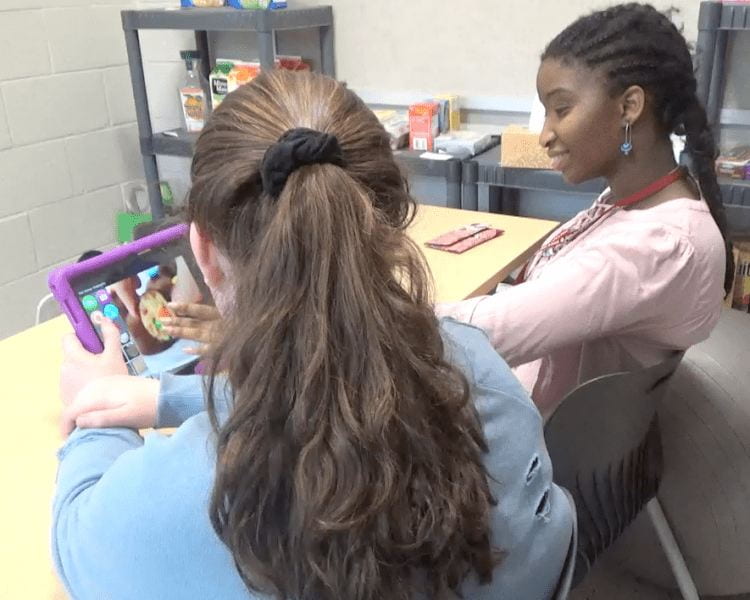
This module explores various applications of a relatively new augmentative and alternative communication (AAC) tool, video visual scene displays (V-VSDs) to promote communication interaction across environments for different types of individuals who may have difficulty communicating. This evidence-based tool and associated strategies has been shown to promote peer interaction, community involvement, and learning. It is effective in children and adults and across varying cognition and language levels and diagnoses. This module consists of readings and interactive material to support translation of research to practice.
To view this article bundle, please register and log in to the AAC Learning Center


Learning Outcomes
You will be able to:
- Discuss at least 2 benefits of using video to support interaction
- Describe how to create meaningful V-VSD for use with a range of diagnoses
- Explain how V-VSD can supplement a person’s existing communication methods
Contents in this Course
This course contains three major topics and subsequent assessment and feedback:
1. Use of video VSDs in peer social interactions (approximately 69 minutes)
2. Use of video VSDs to increase participation and communication (approximately 84 minutes)
3. Use of video VSDs during volunteer activities (approximately 59 minutes)
4. Learner assessment and feedback (approximately 6 minutes)
Total: 3.65 hours (3 hours, 39 minutes)
Prerequisites
None
Assessment Type
At the end of the module, you will complete a quiz. You must achieve 80% accuracy to earn CE credit
Accommodations
If you need special accommodations, please contact Beth Frick Semmler at bfs5682@psu.edu or Kelly Webb at kdw5@psu.edu.
Target Audience
Speech-language pathologists looking for evidence-based strategies in AAC and who work with individuals with complex communication needs.
More Information
For more information about this program, please contact Beth Frick Semmler at bfs5682@psu.edu or Kelly Webb at kdw5@psu.edu.
Grievances and Complaints
If you have a complaint regarding registration, delivery process and procedures, facilities, access, service, or any other grievance about the program please submit your written complaint via email to Kelly Webb at kdw5@psu.edu within 30 days after program completion. Upon request, Kelly will provide a copy of how complaints are addressed for any continuing education program offered by the Penn State Department of Communication Sciences and Disorders.
Affirmative Action and Nondiscrimination
Please visit https://affirmativeaction.psu.edu/welcome/statements/ to view information regarding affirmative action and Penn State’s nondiscrimination policy.
If you do not have an ASHA Member Number or are not an ASHA certificate holder, please review the following link which contains ASHA’s Eligibility to Earn ASHA CEUs Online Form. This should be completed as part the reporting process.
Speaker Bios and Author Disclosures
The Rehabilitation Engineering Research Center on Augmentative and Alternative Communication (RERC on AAC) is a multi-site team of researchers, individuals with disabilities, clinicians, engineers, clinicians, educators, and professions who share the goal of researching and designing AAC that meets the communication and participation needs of individuals with disabilities. The contents included in this module were developed under grants from the National Institute on Disability, Independent Living, and Rehabilitation Research (NIDILRR grants # 90RE5017, #90REGE0014). NIDILRR is a Center within the Administration for Community Living (ACL), Department of Health and Human Services (HHS). The contents do not necessarily represent the policy of NIDILRR, ACL, HHS, and you should not assume endorsement by the Federal Government.
None of the authors have a financial interest in the AAC applications discussed in this module.
Selena Babb – Salena Babb was supported by the Penn State AAC Leadership Project, a doctoral training
grant funded by U.S. Department of Education grant #H325D110008 while this research was conducted.
David McNaughton – no financial or non-financial disclosures related to report
Janice Light – no financial or non-financial disclosures related to report
Jessica Caron – no financial or non-financial disclosures related to report
Ciara Ousley – no financial or non-financial disclosures related to report.
Sojung Jung – no financial or non-financial disclosures related to report
Kirk Wydner – no financial or non-financial disclosures related to report